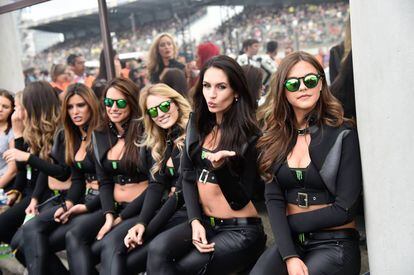Spain’s paddock girls: a touch of glamor or “hypersexualized”?
Jerez council has called on the city's motorbike events to stop “sexist” practice of using hostesses


In motor and motorcycle competitions around the world organizers employ so-called grid girls or paddock girls, usually professional models, to provide a touch of glamor. The motorcycle circuit at the southern city of Jerez, which has hosted some of the biggest events in the sport over the years, is no exception.
From May 5 to May 7, the southern Spanish city of Jerez was once again the location for the three-day Spanish MotoGP, attracting huge crowds, as it has done for three decades. And despite the efforts of the city council, as ever, the event was graced with the presence of a team of paddock girls.
If people want boys, then we’ll welcome them too
Ignasi Sagnier, Dorna Sports
On April 27, the combined forces of the Socialist Party, the United Left, and anti-austerity party Podemos passed a motion in Jerez City Hall calling for an end to the presence of paddock girls at events at the city’s race track.
“For many years, the role of women in motor sports events, and at our circuit in particular, has been restricted to an ornamental one, hypersexualized, and on some occasions, insulting,” read the motion put forward by Podemos.
Following the vote, Podemos contacted Dorna Sports, the organizers of the event, to ask them to stop using paddock girls.
Unsurprisingly, perhaps, the answer was no.
“For us, they are just another part of the paddock, we respect them in the same way we would a mechanic or a member of our team. If people want boys, then we’ll welcome them,” says Ignasi Sagnier, head of communication at Dorna Sports. He says the matter has been blown out of proportion and that his organization has no intention of belittling anybody. He also points out that the decision to employ paddock girls rests with the sponsors of the Grand Prix and the teams competing.

Claudia Fernández, a 31-year-old medical student and part-time model, insists she can make her own mind up about being a paddock girl: “We are against people trying to take this job away from us. In my case, I need the money, because my tuition fees are almost €1,000,” she says, adding she speaks on behalf of all her colleagues.
“They aren’t defending me as a woman, they are taking work away from me. All of the girls here are aware of what we are here to do and why we are here,” says Grace Barroso, a 31-year-old professional model. “We signed a contract outlining the conditions and we know what uniform we have to wear, what we are going to do and how many days we’re going to work. They are paying us to work, we’re not here to flaunt ourselves, which is what the proposal insinuates,” she added in reference to Jerez City Hall’s motion.
Her weekend’s work is not particularly difficult. “We are hired to be seen. That is our main function, but we are also with people in the paddock and in the hospitality room, trying to make the weekend a bit more fun, and we’re also with the sponsors’ guests; we have our photo taken,” explains Barroso.
She adds that the paddock girls are also required to be on the grid before the race, as well as the podium afterward: “We distribute t-shirts, posters and other merchandising material.”
We want them to be dressed respectably and at the same time sexy
Raffaella Pasquino, marketing coordinator at Yamaha
“All we have to do is smile and be happy, that is what Red Bull [one of the main sponsors of the event] wants to transmit: charm, vitality and strength. We walk around the paddock, we have our photograph taken with people, and we always make sure that any men who approach us are respectful, and they do respect us,” adds Fernández.
“We want them to be dressed respectably and at the same time in a sexy way,” explains Raffaella Pasquino, marketing coordinator at Yamaha, who has been working in MotoGP since 2001.
But Spain’s Aspar team, which has been competing in MotoGP since 2010 and is sponsored by Spanish fashion retailer Pull&Bear, does not employ paddock girls, as its team coordinator María José Botella explains: “The image of our sponsor doesn’t match with paddock girls, although the team decided that, not the sponsor.”
Botella says she would like to see the controversy over paddock girls lead to change. “In my opinion, if all you use a paddock girl for is to hold an umbrella, you can probably do without her. For me it would be better to have somebody able to carry out public relations, who could help clients in our hospitality room, accompany guests round the paddock… that would be a good role for a hostess, but it isn’t what tends to happen most of the time.”
English version by Nick Lyne.












































